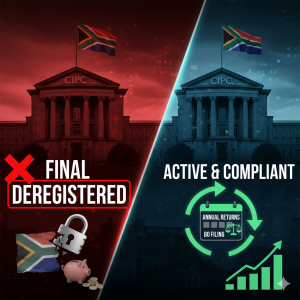URGENT WARNING: The Catastrophic Impact of CIPC FINAL Deregistration

A company’s failure to maintain its statutory compliance, primarily the filing of Annual Returns for two or more successive years, triggers an administrative process that leads to the complete and immediate withdrawal of its legal status by the Companies and Intellectual Property Commission (CIPC).
The status of “Final Deregistered” is not merely a formality—it is a catastrophic event that instantly strips the business of its legal identity and triggers severe financial and legal liabilities.
- The Immediate Loss of Legal Personality
Final deregistration under the Companies Act (No. 71 of 2008, Section 82(3)) has immediate and devastating legal consequences:
- Cessation of Existence: The company or close corporation (CC) is removed from the CIPC register and legally ceases to exist as a separate juristic person (CIPC).
- Invalid Contracts: Any contracts, agreements, or transactions entered into by the company after the final deregistration date may be deemed void (CIPC). This exposes the directors to risk and can lead to financial losses with clients and suppliers.
- Frozen Banking: Financial institutions (banks) are notified and typically freeze the company’s bank accounts, immediately halting operations and cash flow (CIPC).
- Assets are Forfeited to the State (Bona Vacantia)
This is arguably the most severe financial consequence for the business:
- Forfeiture of Assets: All the company’s assets—including immovable property (land, buildings), bank balances, and intellectual property—are automatically transferred to the State as bona vacantia (ownerless goods) (CIPC).
- Loss of Creditor Enforcement: While a company’s debt is not extinguished by deregistration, creditors lose the immediate ability to enforce those debts against the now-non-existent entity (CIPC).
- Personal Liability for Directors and Members
Deregistration does not end the liability of the individuals who governed the entity.
- Continuing Liability: The liability of any former director or member for any act or omission that took place before deregistration is unaffected and continues (CIPC).
- Reckless Trading Risk: Directors who knowingly allowed the company to trade or accrue debt while non-compliant or undergoing deregistration risk being held personally liable for the company’s debts (CIPC). This can also extend to common law actions for reckless or fraudulent trading.
- Notification Failure: The CIPC sends warnings to the registered contact details of directors/members. Failure to receive these due to outdated contact information is the responsibility of the director, not the Commission (CIPC).
Reinstatement: An Expensive and Uncertain Process
While reinstatement is possible, it is not guaranteed and requires a significant administrative effort.
| Reinstatement Requirement | Practical Impact |
| Proof of Economic Value | The company must provide sufficient documentary proof (e.g., bank statements covering a period before and after deregistration) that it was in business or had assets at the time of final deregistration (CIPC). |
| Clearance of Backlog | All outstanding Annual Returns, associated fees, penalties, and the latest Beneficial Ownership (BO) declaration must be filed and paid (CIPC). |
| Process Length & Cost | The process is complex, involves a dedicated application (Form CoR 40.5), a non-refundable application fee (R200.00 as of the latest guide), and is time-consuming (CIPC). |
CRITICAL NOTE: If a company was not in business or held no economic value at the time of final deregistration, CIPC will reject the reinstatement application. The only recourse is to register a new entity (CIPC).
Directors and business owners must check their status on the CIPC register immediately and resolve all Annual Return and Beneficial Ownership arrears to prevent the catastrophic event of final deregistration.
